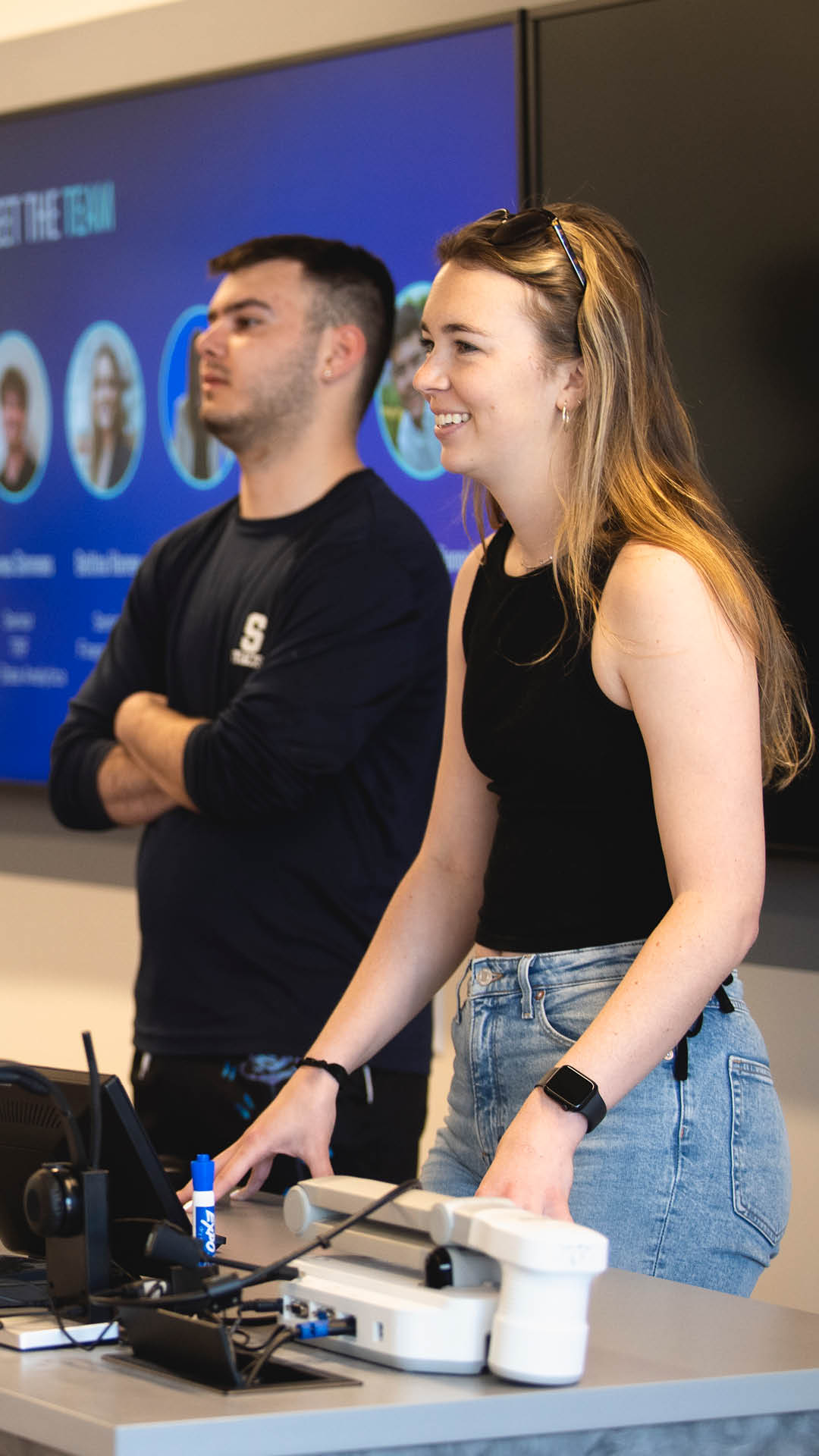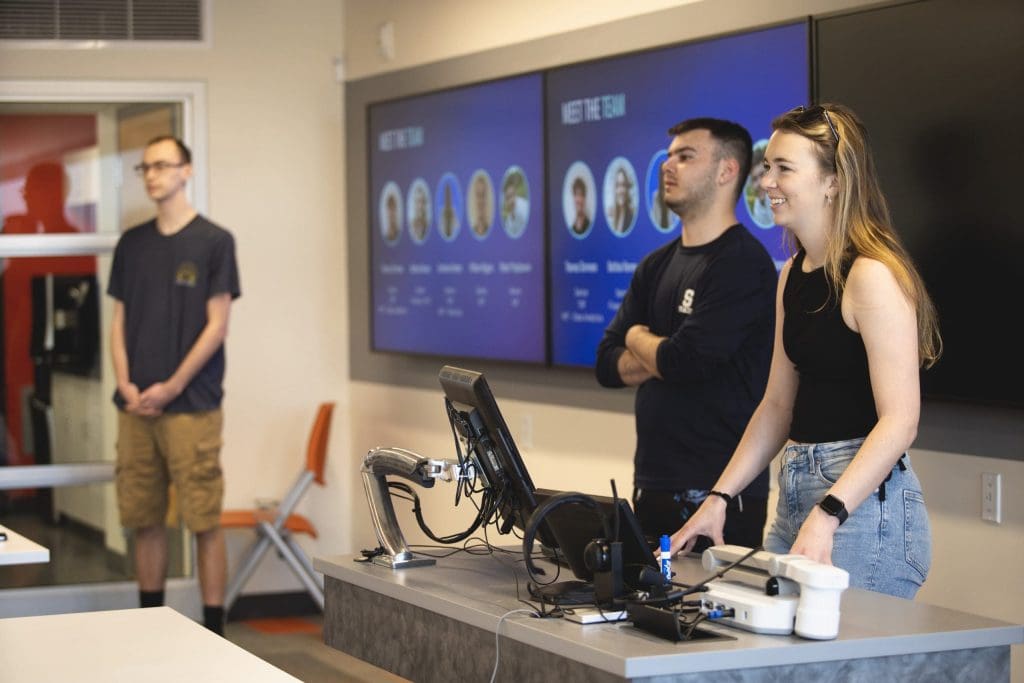Earn Your Bachelor’s Degree in Data Science
Businesses of all sizes are increasingly relying on data to drive informed decision-making and maintain a competitive edge. Our Bachelor of Applied Data Science program equips you with the technical skills and analytical expertise to transform complex datasets into actionable insights. You’ll gain proficiency in data collection, statistical analysis, data mining, and data interpretation, enabling you to identify trends, optimize processes, and contribute to strategic success in sectors like healthcare, retail, sports, and beyond.
- Data-driven decision making empowerment.
- Master visual and computational data science techniques.
- Gain proficiency in in-demand programming languages like R and Python.
- Explore advanced methodologies, including machine learning and AI.
- Tailor your degree with one of six concentrations or a minor.
Program Info

Next term starts:
Spring 2026
120
Total Credit Hours

Program Duration:
4 years

Program Delivery:
On-campus
Courses:
8 main courses and 5 electives

Job Placement:
96%
Admissions Requirements
Scholarships & Awards
How to Apply
Tuition & Fees
The total cost of attendance for students living on campus in 2025-2026 is $92,128 including all tuition, fees, housing, food and transportation costs. Learn more and explore scholarships and financial aid opportunities and different cost options based on housing.
What Can You Do with a Bachelor’s in Data Science?
With a Bachelor’s in Data Science, you’ll be equipped to drive key decisions across various industries. As a data scientist, you’ll help businesses make product, policy, and program choices, or you can analyze consumer behavior and optimize strategies as a marketing analyst.
You could influence critical policy decisions while working with government agencies or identify data-driven solutions to support underserved communities at nonprofits. The demand for data-driven insights spans every sector, and with your expertise, the opportunities are limitless.
FASTEST-GROWING
FIELD IN THE USA
Bureau of Labor Statistics
MEDIAN SALARY FOR
DATA SCIENTISTS
Bureau of Labor Statistics
Expected Growth of
Data Scientist jobs
Much faster than average, BLS
Find Your Community.
At iSchool, we’re a collaborative, forward-thinking community that values fresh ideas and diverse perspectives. Forget the suits—our environment is dynamic and entrepreneurial, making us the fast-paced startup of the Syracuse campus. Join us and unlock a future without boundaries.


Gain Experience.
Many business programs focus on the theory of data analytics, but here, we take a hands-on, real-world approach. That’s why so many of our students engage in major consulting projects while still in school, intern with leading global companies, and gain firsthand experience by traveling the world to see how businesses leverage data analytics in diverse industries. You’ll not only learn the concepts but also apply them in dynamic, real-life settings.


Pursue Your Future.
Each year, our graduates boast the highest job placement rates and starting salaries of any school at Syracuse. This success is driven by their unique blend of technical expertise and business acumen. Top companies like Google, Amazon, EY, and Disney actively seek iSchool graduates, knowing they bring the skills and strategic thinking needed to thrive in the competitive market.
last year’s class
rate of any school at the university



Syracuse University is accredited by
the Middle States Commission
on Higher Education Accreditation.

Courses & Curriculum
The B.S. in Applied Data Science is 120 credits. The curriculum blends major courses with a general core in information technology. Students also have the opportunity to explore other disciplines with liberal arts requirements.
Applied Data Science Primary Core: 21-22 credits
Analytical Course Electives: 9 credits
Concentrations and Electives: 15 credits
University Wide Requirements
Student Success Stories
Meet Our Alumni
Join a global community of scholars dedicated to advancing our understanding of information, exploring the limits of technology, and examining their impact on society today and in the future.
Through their efforts, they help bridge the gap between technology and its real-world applications, demonstrating the far-reaching impact of their work on communities and organizations worldwide.
Visit our Alumni & Friends page to discover more about their inspiring stories and connect with fellow alumni.

Pivoting to an iSchool Education Opened New Pathways to Success for Recent Graduate
By expanding her educational horizon, Mia Perry ’24 changes her entire career trajectory, discovering her passion for data science. In her new role as a consultant at CohnReznick, she bridges creativity and technical expertise to deliver impactful solutions.

Jeffrey Saltz
Professor Jeffrey Saltz is here to share insights on leveraging data and AI, with experience from JPMorgan Chase.

Christopher Dunham
Join Professor Christopher Dunham for insights on big data, machine learning, and the future of data science in public health.

Jasmina Tacheva
Join Professor Jasmina Tacheva as she explores how social media drives social justice and digital activism on key issues.
Faculty Experts
At the iSchool, we pride ourselves on having a team of exceptional faculty and industry leaders who are shaping the future of information studies. Our experts bring a wealth of experience, innovation, and a passion for advancing technology and society.
With backgrounds spanning diverse fields such as data science, cybersecurity, information management, and more, they are at the forefront of research, teaching, and real-world impact.
Frequently Asked Questions
How long does it take to complete the Bachelor of Applied Data Science degree?
The Bachelor of Applied Data Science degree typically takes about 4 years to complete, assuming full-time study.
Is a Bachelor’s in data science worth it?
A Bachelor’s in Data Science is worth it as it opens up opportunities in a high-demand field with strong job prospects and competitive salaries.
